Socialism on the blood
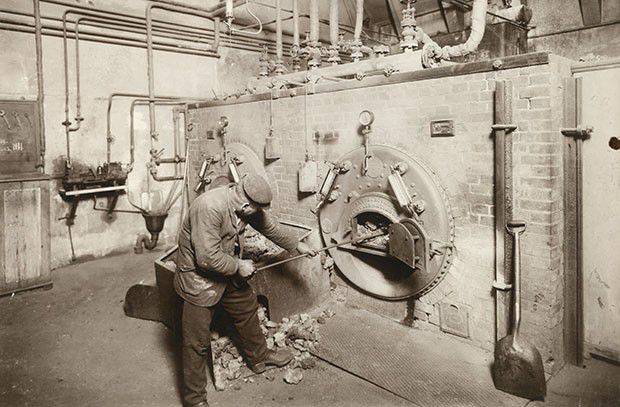
How Sweden nearly entered World War I and got rich on its neutrality
During the First World War, Sweden turned out to be the only European country that managed to sit on two chairs at once - frank militant revanchism and advantageous, extremely cynical neutrality. In August, 1914 in Stockholm, surrounded by the king, was openly called the main enemy of Russia, and, quite seriously, they recalled the offensive defeats in the Northern War, including the Battle of Poltava, and the annoyance of the loss of Russia conquered in 1808-1809. Of Finland. The very next day after Russia's entry into the war in Sweden, mobilization also began, and the Foreign Ministry promised to side with Germany. After fierce discussions, the final decision was postponed, and after six months, the Swedes realized the frenetic benefits of cynical speculation, which allowed them to profit from trade with all the warring parties and directly violating the principle of their own neutrality. It is curious that this behavior of the Swedes turned out to be beneficial to the participants of the war, and therefore no one began to catch their hand. As a result, Sweden turned out to be one of the main beneficiaries of the world slaughter, becoming the champion in terms of the wealth earned from it, even among other European countries that also held a neutral position - Denmark, Holland, Switzerland, Norway and Spain. (About how these countries lived and survived during World War II, the “Russian Planet” described in previous articles).
Swedish "activists"
By 1914, the Swedish army did not fight exactly a century - the last fighting in its stories ended in August 1814, when Sweden, after a short and almost bloodless war, annexed Norway. With this, the Swedish nobility compensated for the loss of Finland, which in the 1809 year was conquered by Russia. Nevertheless, the Swedish elite lived at the beginning of the 20th century with memories of the former greatness of a superpower. The King of Sweden Gustav V and his spouse Queen Victoria openly sympathized with the Kaiser of the Second Reich, and already in 30-s, Gustav will closely communicate with Hitler's entourage.
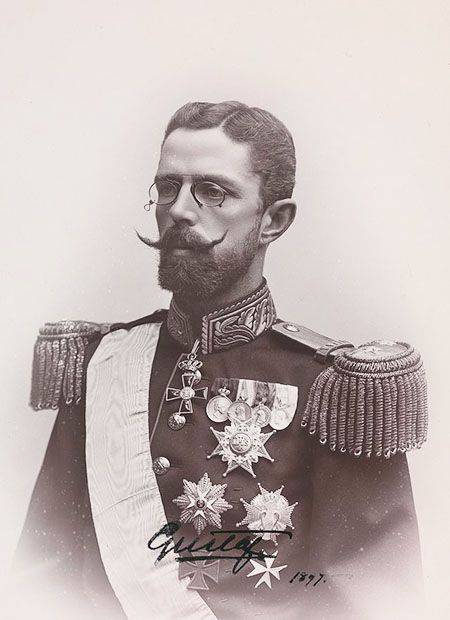
It is curious that the Swedish Queen, before her marriage, the German Duchess of Baden, in her youth was in love with the uncle of the last Russian tsar, Grand Duke Nikolai Nikolayevich, who became commander-in-chief of the Russian army in 1914. Their marriage was hindered by the fact that they were relatives, cousins, and cousins. These details of the centuries-old intimate life of aristocrats clearly demonstrate that in 1914, Europe was flooded with the blood of millions of people entangled in intrigues by a bunch of crowned relatives.
Gustav V was the last Swedish monarch who actively intervened in politics. The royal couple relied on the so-called "activists", as in Sweden then called supporters of an active foreign policy aimed at returning the status of the leading power of Scandinavia to the country.
During the war, in alliance with Germany, the riksmarshal (head of the court department), the former head of the Swedish Foreign Ministry, Count Ludwig Douglas, the second cousin of the Swedish queen and a descendant of Gustav Douglas, personal bodyguard of Karl XII, who was captured during the Poltava battle, spoke against Russia. Earl Douglas at the beginning of the 20th century was the de facto leader of the Swedish nobility and traditionalists, supporters of the return of Finland to the war. Swedish “activists” also planned to regain control of Norway, which since the end of the 19th century has been in the orbit of the English economy and politics. Some leaders of the Swedish "activists" went even further, expressing the popular thoughts at the beginning of the 20th century about uniting the "Nordic Aryan race" and including Sweden into the German Empire as autonomy in the style of the Bavarian kingdom.
Anatoly Neklyudov, the Russian ambassador to Stockholm, left an exhaustive description of such sentiments in a report from 29 in March 1914 of the year: “Two opposite trends now dominate life in Sweden. On the one hand, the old and closely knit Swedish nobility feeds on the memories of the time of Charles XII. It is hard to imagine how the memory of Narva and Poltava, Gangut and Gogland is alive here. The Swedish nobility has now rallied around the throne, sympathizing fully with the moods of the Prussian youth, is dreaming of creating such a army that, under favorable circumstances, would give the descendants of Levengaupt and the Horns a good chance to remove from the scabbard the old rusted sword. The views of the nobility adjacent most of the Lutheran clergy, much of the wealthy peasantry, the university world in the face of the majority of professors and even students. But next to him and other currents got stronger. Sweden is increasingly becoming an industrial country. Influential capitalists and financial figures are supporters of neutrality, and even anti-militarists. ”
By the beginning of the 20th century, Sweden had become a developed industrial state, with an economy closely associated with both England and Germany. And the struggle of these two directions - the “activists” and supporters of neutrality - predetermined the duality and uncertainty of the policy of Sweden in August 1914.
Militant neutrality
On August 2, 1914, mobilization of the army and fleet, special attention was paid to coastal defense - precisely in the light of the “Russian military threat”.
The permanent composition of the Swedish army was small - about 25 thousand, but after mobilization Sweden with a population of over 5,5 million people could raise its number to 400 thousand. The Swedish navy had 10 adapted for battleships, the 1 modern cruiser and fifty destroyers. Being significantly inferior to the Russian Baltic Fleet, he, nevertheless, in alliance with the German Navy, could become a serious opponent.
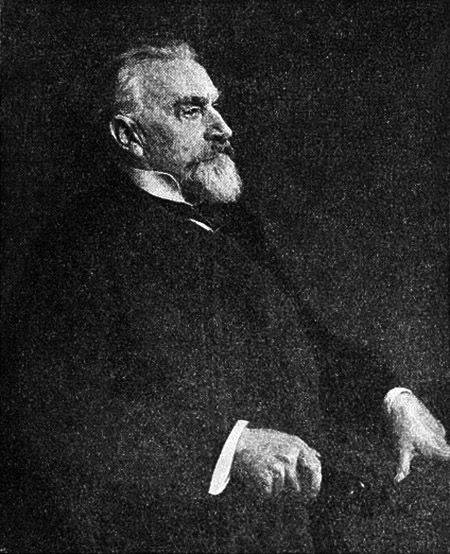
Therefore, 2 August 1914, the command of the Russian Baltic Fleet seriously considered the issue of a preventive strike on the Swedish ships. The question of neutrality in Stockholm was then only discussed and very tough. On the same day, 2 of August, Swedish Foreign Minister Knut Wallenberg (one of the largest bankers concurrently) threatened the British ambassador that Sweden would enter the war on the side of Germany if England intervened in the conflict on the side of Russia. With doubts and hesitations, but the Stockholm ruling elite rejected this temptation, and on August 6 a declaration of neutrality was made public. At the same time, the Swedish Foreign Minister hurried to visit the German ambassador and assured that the neutrality of Stockholm "will be benevolent towards Germany."
The decision on neutrality was ultimately predetermined by the economy - then the national wealth of Sweden was mainly provided by a highly developed metallurgical industry, which depended on imports of British and German coal. But from England coal was supplied 90%, and from Germany only 10%, so the Swedes sympathetic to the Germans were ready to go to war with Russia, but chose not to go to war with England.
Nevertheless, all autumn 1914 of the year in Petersburg feared that Sweden would still try to take historical revenge. The commander-in-chief of the Russian army, Grand Duke Nikolai Nikolayevich, stated bluntly that Sweden’s entry into the war would be a “catastrophe” and it was necessary “to avoid by all means everything that could aggravate Russian-Swedish relations.
By December, 1914 in Stockholm saw that the European war had suddenly turned into a protracted slaughter without end and edge. The temptation to get involved in it immediately disappeared, and the Swedes began demobilizing the army increased in August, and even refused the German demand to mine the Eresun strait connecting the Atlantic with the Baltic against the British submarines.
As a result, Russia, having noticed the Swedish demobilization, transferred half of its troops from Finland to the German front near Warsaw. In this regard, the German Kaiser Wilhelm II made a real scandal to the Swedish Queen Victoria, when she visited Germany at the end of 1914. But the Swedes had finally decided to remain outside the war. That same December, 1914, on the initiative of King Gustav V in Swedish Malmo, a meeting of all three kings of Scandinavia was held. The Norwegian Haakon VII, the Danish Christian X and the Swedish Gustav V agreed on the position - by all means “stay out of war”.
The last upsurge of Swedish revanchism occurred in the summer of 1915, when, against the background of a successful German offensive in Russia in the Swedish parliament, "activists" again demanded to enter the war in order to "return Finland". However, there already actively opposed the Swedish capital, profit from the neutral trade.
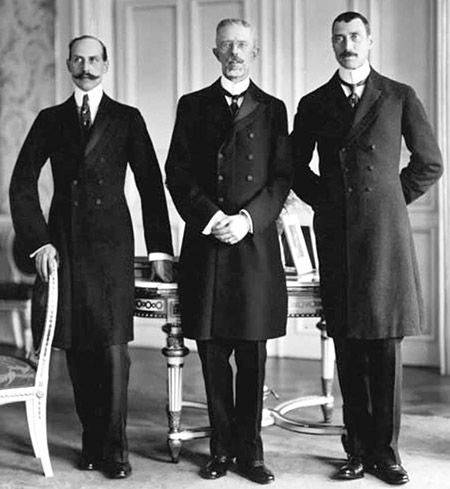
Business on both sides of the front
Neutrality by that time was amazingly profitable. Sweden was the main supplier of iron ore to Germany before the war, but after August 1914, supply volumes increased by 2. Steel from Swedish ore produced a third of all weaponsproduced by Germany during the years of world war.
It was Sweden that supplied the Kaiser army with leather boots, selling up to the end of 1916 of the year to Germany over 4,5 million pairs. Only in March, 1915, the Swedes sold over 10 thousands of heavy horses for artillery to the Germans. Swedish factories behind the scenes for the German fleet secretly manufactured hulls of sea mines and spare parts for torpedoes.
Before the war, Sweden did not have food surpluses, buying it on the foreign market, but after August 1914, Swedish businessmen could not resist the opportunity to make money by selling products to Germany. Since the beginning of the war, the export of pork from Sweden to Germany increased almost 10 times, beef - 4 times. If in the 1913 year, Sweden sold 30 thousand tons of fish to Germany, then in the 1915 year - already 53 thousand tons. At the end of 1915, sales of all types of food from Sweden to Germany increased more than 5 times.
Most of the cotton (the most important strategic product used in the production of not only clothes, but also powders) to Germany in 1914-18 also came through Swedish businessmen who bought it in the United States. According to statistics, cotton sales from Sweden to Germany in 1915 increased by 1913 compared to 323 in the year!
Germany had no sources of nickel, which was then necessary for the production of armor and military equipment. Because of this, the Germans were forced to withdraw all nickel coins from circulation, and from the beginning of 1915, German sales agents bought nickel dishes all over Sweden, and even nickel thermometer cases disappeared from Swedish pharmacies. The government of Sweden, not hiding, then officially turned to England with a request to sell nickel. The British, who needed money, did not immediately see through the Swedish trick and sold 504 and nickel to Stockholm, of which 70 and Immediately, at a price increased by 7, were resold to Germany. And until the end of 1916, German submarines, thanks to Swedish merchants, sank British ships with torpedoes made of English nickel.
But neutral Sweden traded favorably not only with the Germans - by 1916, the export of Swedish goods to Russia increased by 5 again. Moreover, Sweden has taken the advantageous position of a mediator between Russia and Germany. So, in October, 1915 from Russia imported grain to 42 million dollars (in prices of the 21st century) as payment for the production of 150 thousand gun barrels - the Russian army then experienced an acute shortage of rifles. The production of weapons for a warring country was a direct violation of neutrality, but for the sake of gain, the Swedes renounced the principles, and the Russian grain was immediately sold to Germany. The Russian authorities for the sake of additional rifles, and the German authorities for the sake of additional bread together closed their eyes to such a glaring violation.
Throughout the war years, through the mediation of Swedish firms, the products of German factories were imported into Russia, and money was transferred to Germany to pay for supplies. For example, in September 1914, the Berlin plant Simmens, sold to Russia through Sweden 225 thousand e-mails, specially made without inscriptions in German. The Russian electrical industry was then weak and desperate for German equipment, and by the end of 1915, almost 2 million gold rubles went to Germany through Sweden to pay for German lamps.
The flow of Swedish goods to Russia has continuously grown. In 1915, Russia received goods from Sweden (mainly industrial equipment) worth more than 54 million rubles, while selling goods to Sweden only for 4,6 million rubles (mostly flax, hemp and other raw materials), tons. e. imports from Sweden exceeded exports by almost 12 times. Such a huge difference in the trade balance of Russia had to be compensated by gold, which further enriched the Swedish merchants.
It is not by chance that in one of the reports of the German military attache in Stockholm there are such lines in 1915: “With all sympathy for Germany, the vast majority of the Swedish people do not want Sweden to participate in the war. From an economic point of view, Sweden is doing very good business with Russia. ”
Grabbing chocolate instead of Finland
Neutrality profitably earned and Swedish bankers. Germany during the First World War had almost no sources of foreign loans, except for the Scandinavian countries, in which Swedish banks were the main ones. In 1914-18 Sweden has provided loans to Germany in the amount of 13 billion dollars (if you count at the current rate).
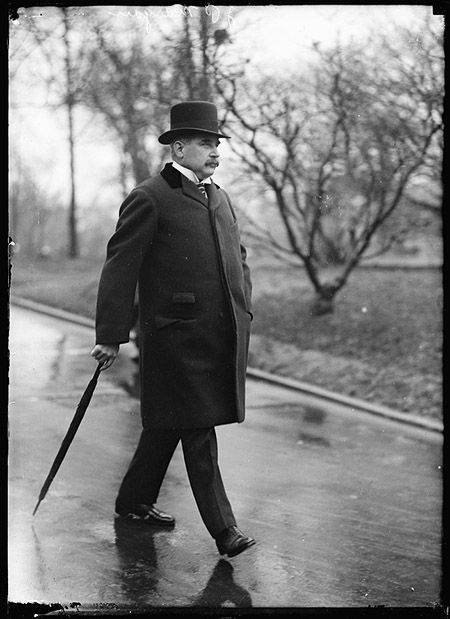
But Swedish bankers cooperated favorably on the other side of the front, for example, Russia in 1915 was through the director of Stockholm Nya Banken Olof Aschberg who received the first American big loan of 50 million (3 billion at the current rate) from the American banker Morgan. Russia until October 1917 transferred gold to collateral loans to Swedish banks. A batch of gold rubles worth over 220 million dollars (at current prices) was transferred by the Provisional Government to Sweden just a week before the October Revolution.
At the same time, the Swedes profited not only from their supplies, loans and re-export of foreign goods to the warring countries, but also from the transportation of goods from England to Russia, which, because of the German fleet, was on land from the port of Gothenburg on the North Sea to the Haparanda railway station on border with Finland. Back in January, 1915, Stockholm adopted a law prohibiting all transit of military goods through Sweden, but in private conversations Swedish businessmen made it clear to Russians that this law was “published under German pressure” and they would find ways to circumvent it. Through Sweden, machines, automobiles and parts for them, dyes, rubber, copper and even explosives were transported to Russia from England.
The Swedes used this transit both for earnings and for political pressure on the Entente. Stockholm agreed that in exchange for the permission of military transit, England would uninterruptedly supply coal to the country, and Russia - bread and fodder for livestock. So, in the spring of 1916, in exchange for 600 and Russian hay from clover, the Swedes missed 184 English machines for Russian military factories to Russia.
Sometimes such trade slipped into frank extortion. By the summer of 1916, there were 163 thousand bags of coffee in Sweden, which the British sent to Russia. The Swedes demanded that 40% of the cargo be left as payment for the transit. The British did not agree with such arrogant demands for a long time, until six months later the coffee began to deteriorate, and London was forced to give up.
An even more comical story came out with a batch of chocolate, which the British sent at the end of 1916 of the year through Sweden to Russia (in wartime, chocolate was not so much a delicacy as high-calorie food for pilots and submariners). The chocolate was transported in 23 cars, and the Swedes demanded that 7 cars be given to them for the transit permit, and the British agreed to give only 4. London, remembering the previous Swedish extortion, was not inferior, and the “chocolate echelon” was stuck for almost a year. As a result, the English chocolate did not get to Russia, mostly spoiled in wagons.
Sweden and the naval blockade of Germany
Since 1914, the huge British fleet has almost completely removed German merchant ships from the world ocean. For some time the maritime trade in Germany was provided by neutral Holland and Scandinavian countries, but the British quickly found justice in them. Already in 1915, the UK demanded inspection of Swedish merchant ships, which were required to enter certain harbors to study and clarify the purpose of the cargo. At the end of the 1916 of the year, after finding out the huge volumes of Swedish re-export to Germany, the British generally forbade any transport by Swedish vessels of any goods without special permission.
These measures immediately led to a reduction in shipments from Sweden to Germany. If in 1916, the Swedes sold 51 thousand tons of fish to the Germans, then in 1917-m only 7 thousand tons. If in the 1915 year, the Swedes sold 76 to the Germans for thousands of tons of cotton from America, then in 1916, they already had nothing to resell. Moreover, when the British fleet detained Swedish ships carrying American cotton worth over 270 million dollars (at 21st century prices), almost all Swedish textile mills stopped.
In July, London 1916 published an official “black list”, in which 2962 firms were found to be involved in trade with Germany, of which 1269 were located in Europe, including more than 300 were Swedish. With such firms were prohibited any contact, their goods and vessels were subject to confiscation. Also, the British were and "gray lists", which fall into the company, only suspected of trading with Germany. They were allowed only business correspondence. Firms that have proven their innocence to relations with the enemy, were included in the "white lists". Identifying firms trading with Germany, engaged in the British consuls and intelligence.
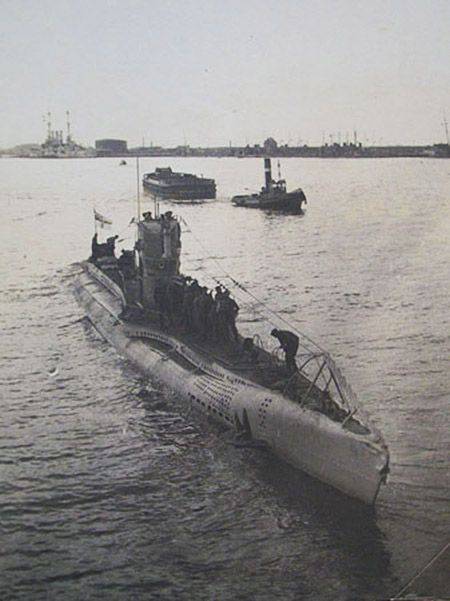
Neutrals, and especially Sweden, actively protested against the introduction of all kinds of lists. This is not surprising - in 1916, the English in various ports of the world detained Swedish ships with cargo worth over 1 billion modern dollars.
All the years of World War, the Swedish navy guarded German merchant ships from Germany and Russian submarines, attacking Germany and Sweden, providing German factories with Swedish ore, and Swedish banks with German gold. At the end of 1916, the Swedes, under pressure from Germany, mined their part of the Öresund strait, finally blocking the straits from the Atlantic to the Baltic, along which British submarines moved. This caused discontent of England, which then even thought about military pressure on the Swedes.
The result of the sharp restrictions on maritime trade was the deterioration of Sweden’s internal situation. If in the first 1,5 of the war year the standard of living and consumption did not change, and even increased in some indicators, by the end of 1916, the Swedes for the first time experienced military difficulties. But the real problems began by the summer of 1917, after the Germans declared an unlimited submarine war (German submarines got permission to sink any suspicious ships without warning), and the USA entered the war on the side of the Entente. During the war years, for various reasons, 280 of the Swedish ships were sunk, and 1150 of Swedish sailors were killed.
As a result, by the end of 1918, the prices of key imported goods soared sharply in Sweden - the price of coal rose 15 times compared to pre-war, and gasoline prices 50 times. “The cost of living from the beginning of the war to the first half of 1918 doubled and continued to grow,” wrote the Swedish historian Ingvar Andersson. - An attempt to establish solid maximum prices failed. When the rationing of prices for flour was introduced, grain began to be used for other purposes and, when sown, replaced with other crops for which there were no fixed prices. As soon as the shortage of goods began to be felt, sales from under the floor and speculation in food and other necessities began to flourish. Special commissions have been set up to settle supplies; in the middle of 1916, sugar rationing was introduced, and in 1917, rationing of flour and bread, fats and coffee was introduced. ”
In the summer of 1917, the Swedes managed almost the impossible - they agreed with the British and the Germans that they would miss the 33 large trading steamer with foodstuffs purchased in South America to Sweden. True, along the 3 steamer’s way, German submarines sank, whose commanders did not have time to warn about the Swedish convoy.
Against the background of the extremely difficult situation in the warring countries, the French, German or Russian situation in Sweden would have seemed the height of prosperity, but the Swedish historian describes it with notes of tragedy: “Rationing touched almost all the most important products, among other things, potatoes and peas. Surrogates became more diverse: beets, rye and dandelion roots replaced coffee, various flowers were used as tea, black currant leaves were used for smoking, ropes and bags were made from paper waste, kerosene was replaced with carbide, all soap substitutes were tried.
The last operation of the Swedish army
1 March 1918, the Swedish government has entered into an agreement with England to import food into the country in exchange for guarantees that it will not be resold. Moreover, Stockholm agreed to transfer half of its merchant fleet to England and the USA. In fact, this meant complete Anglo-American control over Sweden’s foreign trade. After this, relations between Berlin and Stockholm were not broken only because the Swedes missed the German ships that had landed troops in Finland through their waters. A little earlier, at the end of February 1918, the Swedish army conducted the last military operation in its history, landing on the Aland Islands (between Sweden and Finland) to protect their inhabitants.
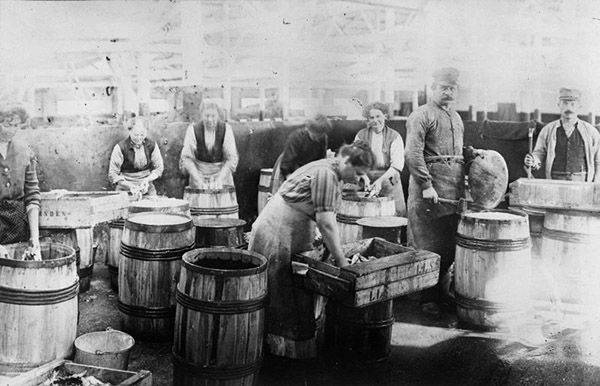
At the beginning of 1918, several hundred Swedish officers under the command of Colonel Harald Jalmarsson participated as volunteers in the Finnish civil war on the White side. Swedish colonel Yalmarsson then became general of the Finnish army.
Despite the difficulties with products that are in 1917-18. experienced the poor strata of Swedish society, neutrality turned into golden time for Swedish business and industry. While other countries were killing their citizens in the trenches by millions, in Sweden there was a boom of commercial and industrial joint-stock companies — only 1916 was established in 2000 in the year, more in 5 than in the period of the highest pre-war market conditions.
An example of one of the smugglers, detained by the British in 1916 year, testifies to the super-profits of individual Swedish businessmen - he earned 80 million dollars (in prices of the beginning of the XXI century) for resale to Germany of rubber bought in England in just six months.
Sweden's state gold reserves from 1914 to 1918 year increased almost 3 times. The value of securities of Swedish joint-stock companies has increased by more than 3 times, and the savings of ordinary Swedes in banks during the war years have grown an average 1,5-2 times. Already at the end of 1918, the Swedish Riksdag parliament approved laws on the 8-hour day, universal suffrage, reduction of military service and salary increases.
Sweden before the war, thanks to a developed metallurgy and chemical industry, was considered a prosperous and socially developed country. Suffice it to say that universal primary education in Sweden was introduced almost a century earlier than in Russia. The years of world war added to this well-being a huge golden bonus, allowing the construction of the famous “Swedish socialism” at the expense of the profits of someone else’s blood.
Information